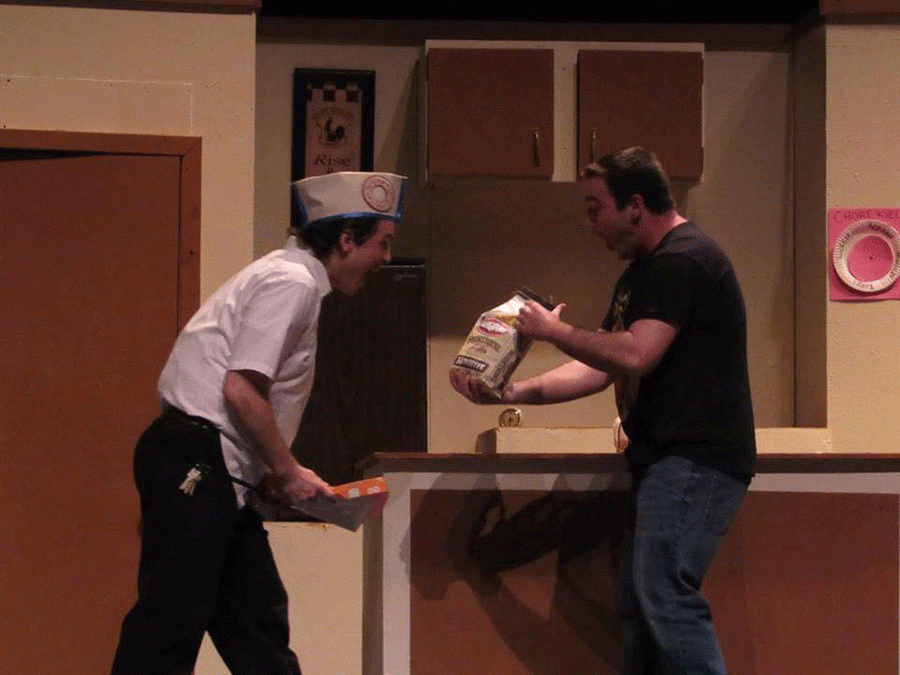“The Boys Next Door” humanizes the intellectually disabled
It seems daunting to bring any character to life. The added challenge of “The Boys Next Door” is that JSC actors had to get inside the heads of the intellectually disabled.
Opening show was Wednesday, Nov. 4 at 1:00 p.m. The following shows were Nov. 5-7 at 7:00 p.m.
The play was written in the early 1980’s by Tom Griffin and directed for the Dibden stage by Russ Longtin and Assistant Director Stephanie Zello.
I commend Thomas Gunn and his portrayal of Norman, one of four men who live under the assistance of social worker Jack (Sawyer Masure). While not the lead, Gunn’s performance was my favorite, for me, the most convincing. His romance with doughnuts and Sheila (Chelsey Staples) pulled at my heart and stomach.
Norman can’t wait to show Leila his pad, with pictures on the walls, chairs, couches. Norman owes his thanks to Set Designer Andew Tascarella, and Props Master Taylor Brown for decorating so nicely.
When Norman spoke I felt his worry and wonder–“oh boy, oh boy!” I believed his sincerity and love; I felt I was watching one who’s unable to fully understand and deal with daily life.
I was watching someone very human, which was the play’s point.
There were moments that dragged, but most of the play induced laughter, “aws” and quiet introspection. The banter between Norman, Arnold (Cody Logan), Lucien (Josh Baughn) and Barry (Shane Wyman) was slapstick mixed with anxiety and confusion, not to mention the inability to convey human urges.
The four living together is a whirlwind of screams at times.
One of my favorite scenes is when Lucien (“Lucien P. Smith!” he said proudly) is allowed, for a moment, to speak outside of his adolescent intelligence. In his suit coat and Spiderman tie, he moved from a State-issued meeting to the front of the stage.
He stood under spotlight as a 35-year-old man. When he spoke his struggle I felt the struggle of all intellectually disabled, and how society often compacts them into “the others.” It’s ridiculous that Lucien would stand in danger of having state assistance taken away. It makes it clear why Jacks are needed.
The main problem– Jack is burnt out and must decide if he is going to leave and let another social worker help the gang.
This is where I wanted more. Jack seemed more uncomfortable than burnt out. He wasn’t as round of a character as Norman, Arnold or Lucien. Maybe this is because the audience didn’t see him at home, or because his job is literally dealing with uncomfortable and awkward situations. His breakup story is relatable, but his ex “looking great these days” wasn’t as compelling as the other drama.
Some of the interactions between Jack and the boys were realistic and had an appropriate distance to friendship ratio found in good social workers. I felt proud for Jack when he accompanied Lucien to his important meeting. Overall, I didn’t get the feel for how much Jack loved these people, or how good he was at his job, and I think the first was supposed to be one of the points.
Jack took the spotlight to speak about the social inequality and hardships of the people he helps. The spotlight move was used quite a bit in the play, giving immediacy and intimacy, a break from the fast moving, sometimes chaotic narrative. Shout out to Master Electrician and Light Designer, Shawn Weibel.
Some of the best dialogue was by the always-nervous Arnold. His mind worked at a million miles an hour, trying to solve his million daily problems. It’s evident during scenes where he’s taken advantage of at work and the grocery store or when he attempts to cover up his pee stains at the community dance.
He’s left to tell his constant woes to his roommates, social worker, and the crowd. Arnold’s spotlight scenes were the best, probably because he, like Barry, is given a complete vocabulary.
Barry is described as schizophrenic. He’s been institutionalized and according to Jack (who does know his stuff), shouldn’t be living in the apartment community. This touches on the system that can misplace and misdiagnose.
Barry’s character, like Norman and Sheila’s romance, offers an important relationship outside of the core characters. His dad is coming to visit, he keeps reminding everyone. When the two reunite after nine years it leaves Barry changed for the rest of the play.
He also offered a unique comedic presence. He has convinced himself he is a golf pro, and flaunts it. He gives lessons to fellow community members, often yelling at them with funny lines about the game. He hides, carefully wrapped in this false identity.
Barry’s comedy was more enjoyable than when he was being deep or in pain.
Most of the scenes took place in the gang’s apartment, an appropriate, neat, and simple set. It consisted of four doors– entrance, bathroom (where they flush a rat, or is it the neighbor’s hamster?) and two bedrooms.
Kathryn Finegan was the Stage Manager, and Jessica DeRosa was the Assistant Stage Manager.
Rachael Garnjost was the Costume Designer, (loved the outfit switch for the dance scene), Kayla Juettner the Makeup Artist, and Patrick Monaghan was Sound Designer.
Other cast included Carol Wade (played Mrs. Fremus/Clara), Kylann Tanner (Senator Clarke/Mrs. Warren), Sam Lewis (Mr. Klemper/Hedges), and Travis Noyes (Mr. Corbin).
“The Boys Next Door,” put a face to the faceless. It brought alive the part of society that is thought of as less human, and gave them a name, and all the desires including romance, smarts, and success.
It wasn’t new or revelatory to realize they possess these, but it sure was nice to get to know these boys and their worker.
Travis LeClair joined the Basement Medicine staff in Spring 2014, assuming the position of staff reporter.






